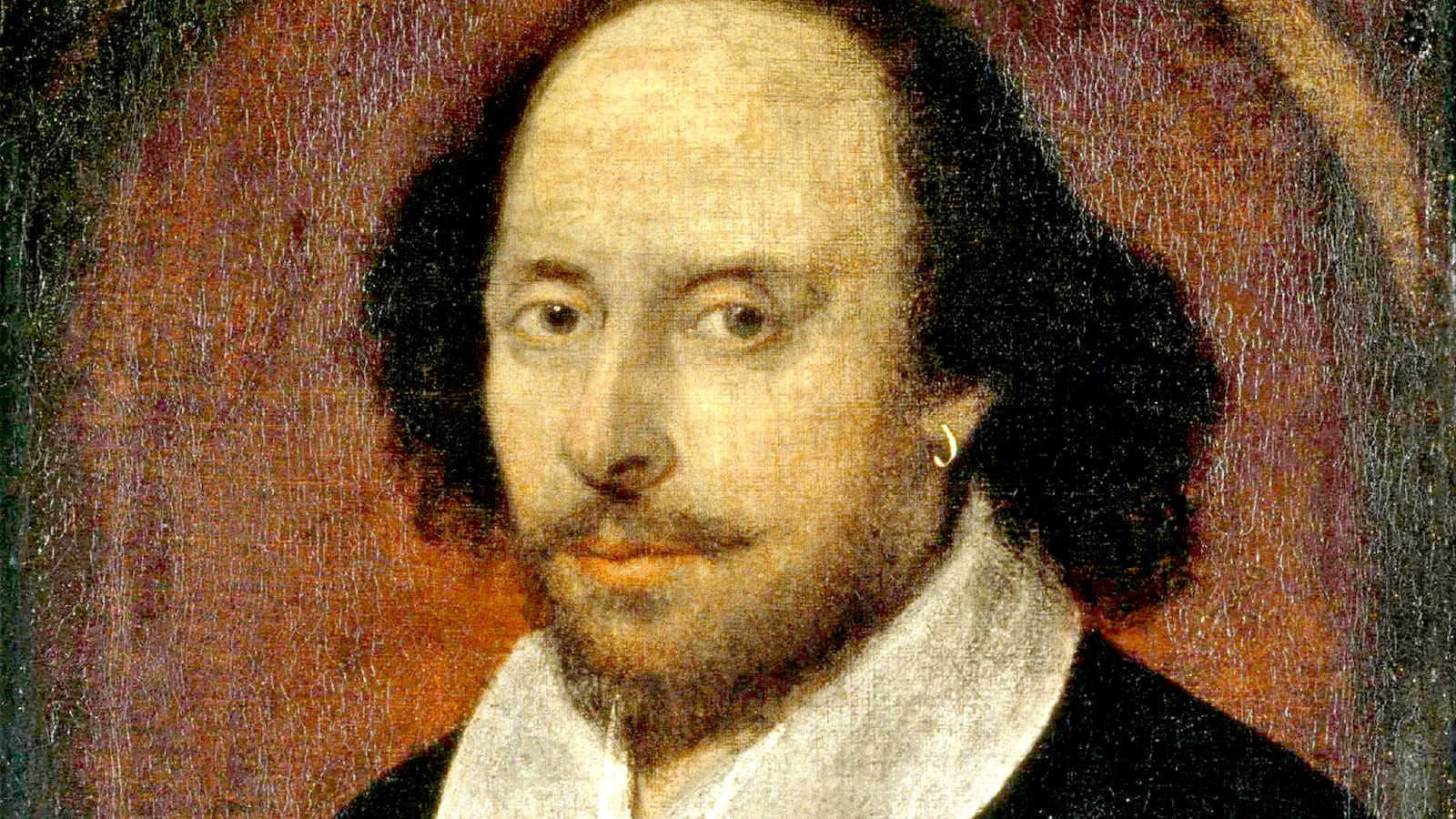Shakespeare must have had a nice butt.
This is the thought that runs through my mind during a 200-mile cycling journey from Shakespeare’s hometown of Stratford-upon-Avon to London, where his plays were produced and where three theatre houses bear his name. Forget whether or not he’s “relatable” (a conversation drummed up by Ira Glass earlier this year), pay no attention to the umpteenth ultra-special-24-karat-gold-embossed edition of his works, or that this year marks the 450th anniversary of the great playwright’s birth. All I could imagine was that if he consistently made the trip now known as Shakespeare’s Way, he definitely possessed some great glutes. Never mind that he may have traveled the long, beautiful path by horse rather than my mode of transportation, a sleek hybrid bike that would look as unfamiliar to the man of letters as an iPhone 6. Let’s assume both horse and hybrid provide similar workouts.
Throughout the five-day journey arranged through The Carter Company, which organizes cycling and walking tours through Europe, I went from being terrified to hop on the bike to being sorry to part with it. Beginning in London and ending in Stratford-upon-Avon, the Shakespeare’s Way itinerary mimics the path the Bard may have taken and celebrates the countryside that surely inspired his works, along the way hitting high points that are more elusive to a visitor not on two wheels. My trip takes the reverse path, and I begin by assessing the depth of my Shakespeare knowledge in his birthplace. It was paltry. I had no real sense of the man himself, except for a college lecture by a renowned Shakespearean scholar that’s rattled around my brain for years. “Shakespeare,” said Professor Watson, “wrote a story for each of us and in them we can hear what we want.”
So that’s my starting point. That and the realizations that I haven’t been on a bike in 10 years, and padded bike shorts are a real invention and I should have considered purchasing a pair before embarking on 20 miles a day. So I’m not the most responsible cyclist in the world. Who cares? Neither was Lance Armstrong.
* * *

My journey starts at Stratford-upon-Avon, the little hamlet of around 26,000 people that’s filled to its borders with Shakespearaphernalia. Will’s name and face are on every pub. Plaques decree where he was born, ate, peed. (Maybe not that last one.) The town is exceedingly easy to cycle around, and when a tour guide suggests a detour to Anne Hathaway’s cottage my first thought was, “Wow, I wonder if the Hathahaters know the actress has a country house here?!”
But, no. This was Shakespeare’s Anne, the identically-named wife he married at age 18. Not Hollywood’s Anne. I know even less than I thought.
At Shakespeare’s Birthplace, a man in a period costume consisting of an ivory, open-collared shirt under a slack tan vest greets visitors with entwined hands and a cadence so slow I imagine he’s been honing this rhythm for a couple centuries. Outside in the courtyard, a pair of twentysomething actors improvise a scene from Shakespeare’s most famous love story. One guy hams it up as Juliet, blonde wig and all, as a crowd gathers, delighted by the impromptu performance.
The birthplace is a treasure trove of facts. Apparently, Shakespeare coined 1,700 words, from the frequently used (excitement) to the should-be-more frequently used (spewed). I wondered if these would prove useful later in the week: “After a hearty sampling of ham hock terrine at The Hinds Head in Bray, the girl jumped on her bike in excitement and spewed all over her handlebars.” Fortunately, this would not come to pass.
After spending the night at The Shakespeare Hotel in Stratford-upon-Avon (classic or luxury accommodations are included in the price of the trip, which ranges from £1,245 to £2,340), we were off to visit the Pashley factory, which manufactures around 10,000 gorgeous bikes a year, where I learn two things: Hand-building a bike is an insanely intricate process, and that on the weekends, Stratford-upon-Avon is full of MAMILs: middle-aged men in Lycra. Too bad the stretchy fiber wasn’t invented until 1958; Shakespeare, who died at age 52, would have made a perfect MAMIL.
Then it was time for the most extensive biking of the day, through the Cotswolds, known for its charming country homes whose quaint exteriors do a fine job of masking high price tags and very wealthy owners. Here is where the biking becomes the most beautiful — and increasingly challenging. “Gently rolling hills” roll not-so-gently under my tires, but the English countryside scenery is soporific. I try not to crash. The sky is cloudy and moody and sheep are bleating (cyclists must appear amusing to them as there are hardly any cars) and everything is entirely picturesque, except for the dead badger on the side of the road. As I get the hang of my bike (note: best not to change gears while stopped), fields and trees and the darling Chipping Campden and Moreton-in-Marsh towns fly by faster and faster, and I become convinced that cycling is the ideal way to take in such a sprawling country. The only thing that gets me to slow down is the promise of lunch and a cheese room at the organic farm and restaurant Daylesford in Gloucestershire. The cheese room does not disappoint.

Even though this is the comparatively easy cycling tour, (The Carter Company has two Shakespeare’s Way tours: the 10-night “gentle” version or the 7-night “not so gentle” route) that night, after riding 20 or so miles, I feel a bone-deep exhaustion, and am surprised by how good that pain feels. I tell this to one of my new friends, a Belgian fellow named Sam, who’s as skilled at cycling as I am at making a shepherd’s pie disappear, and he agrees. He says biking long distances is “like coming to peace in your mind and your body.” After biking dozens of miles a day, will I become this zen?
Most people who take cycling “holidays” to experience a new place would probably huff and puff the entire way, though if they grow tired there’s always the option to hop in the van that transfers luggage from hotel to hotel. That’s how our group speeds up to finish the trip in time and get to Oxford the next day. There, it’s back on the bikes, which prove an ideal perch to sail past schoolboys wearing tails and solemn faces. But my goodness, even the air around Oxford University is studious. After a 40-minute car ride, the village Stoke Row becomes the start of the most challenging bit of the journey: the Chiltern Hills, the beautiful yet terrible, rolling little miles that prove an exercise in willpower. I strain and push and pedal and wonder, “When will this end?” But then the summit gives way to the other side of the hill, and a childlike glee arises from the whooooosh of the descent.
Later in the day, we find ourselves riding alongside Dorney Lake and through Eton village, the old stomping grounds of Princes William and Harry, where a group of handsome, clean-cut men are getting in their daily sprints. Someone says, “There goes the future prime ministers of England,” and so I shout my American cell phone number in their direction, but alas, I’m pedaling so fast the digits are lost in the wind.
The next day, after driving to Putney on the outskirts of London, we start the end of our journey. After days of hills and solitude, coming into London on a long stretch along the River Thames—from Putney to Battersea to the London Eye, all the way to the stunningly reconstructed Shakespeare’s Globe Theatre—is like popping out of hibernation after a snowstorm and being surprised there are other people who survived.

Confronted by city life I can’t help but notice cyclists everywhere, whether creeping up at intersections and alongside cars, jetting down narrow roads, or flocking to Look Mum No Hands, a British-version-of-hipster cycle cafe where you can get a bike tune-up, eat a meat pie, and memorize the quote by superstar Belgian cyclist Eddy Merckx hung up in the bathroom: “Ride as much or as little, or as long or as short, as you feel. But ride.” But the cafe’s just one example of England going batty for biking. Visitors rent “Boris Bikes” around the city, and at Lee Valley VeloPark, the Olympics venue which was transformed into a cycling smorgasbord in March, there’s the choice of four different terrains: BMX, road, mountain, or track, where you can pretend to be an Olympian on a fixed wheel bike with no brakes and clipped-in cleats on a velodrome track that tilts at a 42-degree angle. Maybe cyclists have always been riding around, but I just never paid them any attention. Like Romeo and Juliet, we lived in different worlds — until now.
* * *
After the tour ends, I’m depressed and desperately missing my bike (which came to feel like an extra appendage), my helmet, even the squeeze of my daily Lycra ensembles. But surprise, surprise, I am also inspired.
Most travelers return home from trips revitalized and armed with new goals. For a few days (maybe even just one) they’ll view their surroundings through that post-journey haze where everything feels unfamiliar, but the truth is that life rather quickly resumes its normal state. The big vows — to immediately buy a bike and cycle 20 miles every weekend, to read the entire Shakespeare canon — are displaced by buying groceries and returning emails.
The buzz wears off.
Yet the small remnants of memory are more potent, and pop up in the strangest places, like, for instance, the Trader Joe’s cheese aisle. A few weeks after returning from England, I was trolling the dairy section and came across the Cotswold Double Gloucester. And I was taken back to the exact sensation of rolling through that countryside, and from there I remembered the entire journey and the elation and exertion and…you get the picture. All from a shrink-wrapped hunk of cheese.
Similarly, now every time I hear the name Shakespeare I recall the thin leather gloves strung up in his dad’s glove-making shop, or the First Folio under a glass sheath at an exhibition in Stratford-upon-Avon. In the same way, bikes no longer look to me like a single mass of machinery. Now they’re the sum of individual parts working in tandem to get its rider from point A to point B.
Every travel experience, good or disastrous, works a bit towards molding a giant block of knowledge, and consciously or not, you’re constructing something massive — a more authentic, knowledgeable self; a person of greater empathy and experience who knows more about the world; a social media braggart thirsting for more ‘likes.’ What I do know is this trip remains vivid because, while speeding past sights and sounds, I was forced to drink them in all at once. Slowing down, stopping or — God forbid — reaching for my iPhone would have meant crashing and ending up right next to that dead badger.
So I suppose that’s the new story my dear, long-dead friend William wrote for me: that I should open my eyes, yield to pedestrians, and never, ever fear the bicycle.






